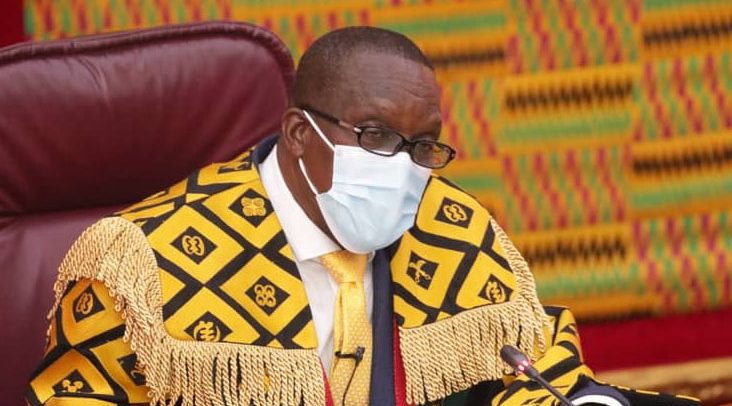Former Member of Parliament for Nadowli Kaleo in the Upper West Region, Alban Kingsford Sumani Bagbin, was elected Speaker of the Eighth Parliament on Thursday in an eventful night inside the Chamber of Parliament House.
He polled unannounced votes of 138 to edge out the immediate-past Speaker of the House, Prof. Mike Oquaye, in the keenly contested election which was characterized by chaos, acrimony and partisanship.
Mr. Bagbin, whose record as a veteran of the House of Parliament and as a former Deputy Speaker endeared him to the lawmakers, boosted his chances of becoming speaker after the New Patriotic Party (NPP) picked Prof. Oquaye as a nominee for the position.
The NPP has 137 MPs, whereas the National Democratic Congress (NDC) has 137 MPs and the ruling party was counting on the support of the independent MP from Fomena to elect the Speaker and form the Majority, but that was not to be.
At the stroke of midnight on January 7, the MPs-elect gathered to elect the Speaker in order to get sworn in as required by law to pave the way for President-Elect Nana Akufo-Addo to be sworn in.
The MPs also voted to retain the MP for Bekwai, Joseph Osei-Wusu as the First Deputy Speaker, while they gave the Second Deputy Speaker position to the Independent MP for Fomena, Andrew Amoako Asiamah.
The House erupted in chaos as the opposition NDC MPs scuffled with their colleagues from the ruling NPP during the election of the Speaker.
The opposition MPs, led by Haruna Iddrisu, repeatedly interrupted the election processes, demanding for the NDC MP for Assin North Constituency, James Gyekye Quayson, to be allowed to take part in the voting despite a restraining order from a High Court in Cape Coast.
The Clerk of Parliament, Cyril Nsiah, had pronounced that Mr. Quayson could not take part in the election of the Speaker since he did not recognize him after serving him with the restraining order from the court.
This pronouncement, which was greeted with protestation from the NDC members, prompted scuffles amidst banging of tables and shouts across the aisle, thereby halting the election process once again.
The House descended into more chaos with some opposition members kicking down voting booths and attempting to snatch the ballot box, while their counterparts also wrestled with them.
Matters came to a head when some personnel from the military and police stormed the Chamber to restore law and order, an action which was misconstrued to be intimidating, something the NDC members described as “an unfortunate event for democracy.”
The NDC MP-Elect for Madina, Francis Xavier Sosu, was heard shouting on top of his voice that “you can’t send police and the military into Parliament.”
The NDC MPs had also refused to allow the voting process to go on when the NPP MPs began showing cast ballots to their caucus leadership, and suddenly several dozen security officials poured into the room.
At this point, things turned more chaotic with punches swinging around, while more scuffles and loud shouts were witnessed with shirts torn.
When voting eventually resumed again for the Speaker position, another showcase of a cast ballot brought the process to a standstill, with some opposition MPs-Elect, who were insisting on secret ballot, kicking the ballot box and the voting screens to the chagrin of Ghanaians.
Calm was however restored for the election to continue, and within a few minutes into counting of votes, another scuffle ensued when the MP for Tema West, Carlos Ahenkora, snatched ballot papers from an officer of the Chamber assisting in the supervision of the poll.
The night began in high drama with the NDC MPs-Elect rushing into the Chamber ahead of their NPP counterparts to occupy the space to the right hand side of the Speaker’s chair, which was reserved for the party with the majority.
The NPP MPs-Elect, upon entering, became offensive initially, but calmly went to occupy the seats on the other side; even though there was a standoff at a point, which saw Ursula Owusu-Ekuful, MP for Ablekuma West, sitting on the laps of an NDC MP-Elect, Kwabena Mintah Akandoh, who was in her seat.
The parliamentary chamber has a seating accommodation for 275 Members and the seats are divided into four blocks, each with rows.
Block No.1 and 2 are on the right-hand side of the Speaker’s chair and are occupied by the Members of the ruling party, while Block No. 3 and 4 are on the left-hand side and are occupied by members belonging to the opposition parties.
By Ernest Kofi Adu, Parliament House


